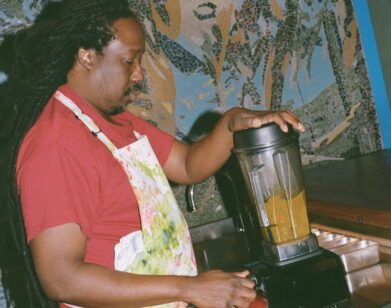Leigh Newman Faces North

ABOVE: LEIGH NEWMAN. PHOTO BY CHRISTOPHER GABELLO
Writing a memoir about your life and love without asking for sympathy requires a great deal of confidence. In Still Points North (The Dial Press), Leigh Newman bares her skin without dishonoring her past. After failing to sell a novel, Leigh wrote an essay for Tin House featuring a scene where she discusses recipes for caribou meat with her father, an Alaskan surgeon who sent her tons of the stuff, frozen. Then, she wrote about taking her husband on an Alaskan duck hunt—when she was five months pregnant—for The New York Times‘ Modern Love column. Publishers, impressed with Newman’s candor, started knocking, and the memoir emerged. Detailing her parents’ brutal divorce, which caused her childhood to be split between her father’s Alaskan wilderness and her mother’s urbane Baltimore, Leigh exposes her past with poetry and empathy. When she approaches her early adulthood, full of adventure as a travel writer, she carefully describes how unromantic healthy love can be.
Newman strode authoritatively into Hillside in DUMBO for our meeting, wearing a Burberry plaid blazer even though it was a sunny Saturday. The blonde, fit 41-year-old Brooklyn resident spoke briskly, with a smile. It was apparent, from the moment we met Newman, that she is in charge of her life in a way most people long to be. On her way out, she helped a woman lift a wide stroller through the door of the café, taking charge and commandeering the staff to open the doors.
ARI SPOOL: I feel like I already know so much about your life. Do you feel concerned that you’ve revealed too much that people didn’t previously know about you?
LEIGH NEWMAN: I don’t feel concerned. I feel confident. I’m just not a talker about my past. Which is interesting, because I wrote the memoir up in flush against intimacy. I am proud of it. I’ve managed to create intimacy with people I know, and people that I don’t know. The longer things stay inside of us, the more we think they are black or tainted, but they’re really not.
SPOOL: Do you think remembering what happened changed your relationship with the past?
NEWMAN: I was always remembering them. I just wrote my memories down. That’s what changed it; making it be public. My mother struggles with sanity, being divorced, moving all over the place, almost dying. People have a much more generous understanding of who I am as a person once they’ve read the book. They understand why I make certain decisions, and it’s more relaxing to me. I didn’t write the memoir with any sort of intention of feeling better. I wrote the memoir because I had a weird need to write a good story. But once I was done, I did feel better about myself. Not better, just calmer. Because a tremendous onus had been lifted off my day-to-day.
SPOOL: Catharsis?
NEWMAN: I don’t know whether you would call it catharsis. That’s too easy. We love that word in America, right? It’s not the catharsis, it’s that to write it you have to come to some reckoning with what happened, so that’s the first step. You have to make some sense out of it. If you want to write in a mature and interesting way, you have to have sympathy for everyone that’s involved. So I had to find and understand everybody’s perspective, and that made me more empathetic and less narcissistic in my approach to what had happened. When you are running the tapes to yourself, you just think about what happened to you, you don’t think about what happened to everybody else; when you need to write it and look at it, you realize all the struggles everybody else went through. It requires a magnitude of vision that you haven’t had before. And after having done that, you feel much more tied to the people in the story. You feel much more intimate with them. It does, for better or for worse, take the pressure of keeping all those secrets—which are not even really secrets—off your back.
SPOOL: You talked about your unsuccessful attempts at writing fiction, and at your job, as an editor for O Magazine, you select books for the club. Do you think loving the characters in your non-fiction made it easier to bring them to life?
NEWMAN: I do. A problem with fiction was I was writing my own life story in a different way, and then punishing everybody. I was the queen of the unsympathetic narrator. People would be like, “You write a really unsympathetic narrator. That’s a fucking scary person.” [laughs] Since my family were real people and I loved them, I wanted to approach it with love. That was the only way I could do it. I wasn’t writing a memoir where I yelled at my parents and at the end we weren’t going to talk to each other anymore, you know how you read those?
SPOOL: I don’t like reading memoirs, usually.
NEWMAN: I didn’t want to make them into monsters. But I don’t think I’ll ever approach a fiction project again in the same way. If you don’t love ’em, you shouldn’t be in bed with ’em.
SPOOL: That’s real! Do you think you’ll re-approach fiction now?
NEWMAN: As a matter a fact, I almost pulled the memoir after I finished it. I had written it without any understanding of it going public. I had no understanding that people were going to see it and read it. Even though I had sold it! The human mind is interesting. When I understood that, very late in the game, I called my agent and said, “I don’t know about this.” He said, “Leigh, this is the book you had to write, and you have to go ahead and put it out there. Otherwise, you’re going to be stuck. You’ve always been a little bit stuck, so let’s move forward so you can write the books you need to write.” It was helpful.
SPOOL: So do you feel like even that story follows the narrative of overcoming self-doubt?
NEWMAN: Yeah. Well, at that point, I didn’t have doubt. I don’t want to sound like conceited ding-dong, but I felt happy with the book. I said what I needed to say, found a form to put it in, and taken all the bad stuff out. I finally had something to say. In the other books I don’t know if I had that, which was part of the problem. I was proud of the writing. I found a voice that managed not to be too strident or too girly, which were two things that I vacillated between. It wasn’t self-doubt. It was like, “I don’t know if I want to engage in this discussion with the whole world, especially since my entire family is involved.” Even though they were being champs.
SPOOL: What’s the discussion?
NEWMAN: There are two discussions. I think we have this culture now of competency and super-achievement, which I see as inexorably tied to self-reliance. I talk about it through the Alaskan lens, where you grow up and you’re hunting, fishing, tying knots, chopping wood, or putting salt on the outhouse poop to make it reduce. You can survive, and you end up being pretty competent, and you take that out to the world. But I do think that porcelain coating of competency is holding a lot of people together who, inside, are pretty lonely. And the more competent you are, the more people are going to go with it. No one is going to crack that porcelain until you do. I meet a lot of people like that, where there’s a real disconnection. Another thing is you have to look at divorce. Nobody really wants to look at it. In fact, I tried not to look at it in the book. All I did was take the story of my parents’ divorce and slap it next to the story of my almost-divorce and let people come to their own conclusions, because I don’t know if you can explicate it. I’m not sure why some people can get over divorce so easily and some cannot. Clearly, I took it pretty hard.
STILL POINTS NORTH IS OUT NOW. LEIGH NEWMAN WILL TALK WITH A.M. HOMES AT THE STRAND BOOKSTORE IN NEW YORK TONIGHT, APRIL 3, AT 7 PM.






